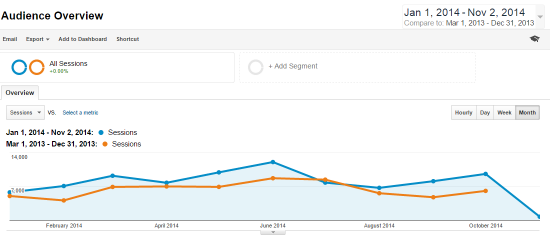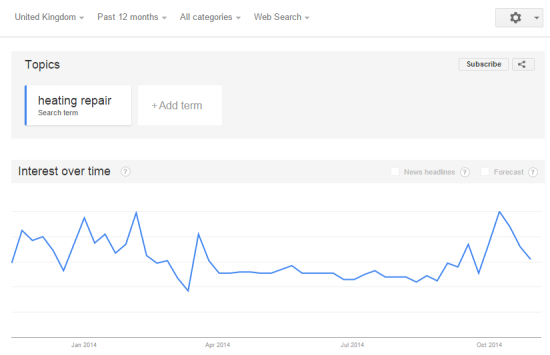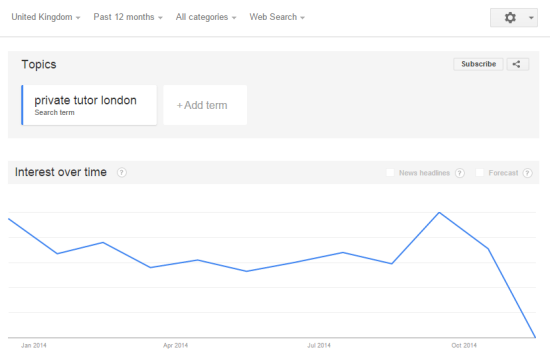Seasonal SEO: How to prepare your site for every season
Every business has one or several peak seasons or periods of time during the year when their products or services are more popular than usual. Whether it’s a holiday like Valentine’s Day, Christmas, a sports event or any other occasion, you need to change things up, redecorate, do things differently and make the most of that occasion to increase traffic to your site and make more sales.
The trick to making this work for you lies in knowing when this peak season is for your business and what exactly your audience is searching for.
This is where seasonal search engine optimisation (SEO) comes in handy. Read on to find out what it is and how you can leverage trends and peak seasons to attract more visitors and sales.
What is seasonal SEO?
Seasonality refers to the changes in the way users interact with search engines throughout the year. So, seasonal SEO refers to optimising your site for seasonal keywords in order to get more visibility in search engine results during a specific period of time.
You may have noticed that your web pages or blog posts fluctuate in rankings over time. If you take a quick look at your Google Analytics account, you’ll probably see spikes of traffic in January or August or December. This is due to “seasonal” events or occasions when people are more (or less) interested in your offering.
To make things clearer, let’s take a simple example. With the winter holidays fast approaching, people are already starting to search online for “Cocktail dresses for Christmas”, “Christmas decorations” or “Christmas gifts for kids”. If your sell any of these items, you will need to adjust your SEO strategy to ensure you attract as many of these potential customers as possible.
This means that instead of optimising for “gifts for kids” as you’ve done all year, you’ll now need to start optimising for seasonal keywords like “Christmas gifts for kids”.
This is just an example, which may very well not apply to your business. If you’re a plumber or an attorney, don’t expect a spike in traffic during Christmas. But if you’re a florist, a photographer, a cleaning or catering company, the winter holidays are sure to bring you more customers if you know how to use seasonal SEO to your advantage.
Every industry has its peak seasons and once you identify these trends and opportunities, you’ll be able to create strategies around them and optimise your site to reflect those special occasions. When used right, seasonal SEO can be a great tool to help you get an edge over your competitors.
When is the best time to start a seasonal campaign?
The most crucial part of seasonal SEO is timing. Since SEO campaigns take time to implement and to get results, you need to plan and lay everything out in advance. While this also depends on the industry, you should usually begin preparing three-to-four months ahead of time to ensure that your targeted products and services are visible in search engine results by the time users are ready to purchase.
This includes:
- Thinking about the promotions you want to offer
- Doing keyword research around those promotions
- Creating landing pages and supporting content optimised around those seasonal keywords
There’s loads to do so make sure you start early so you have time to get everything done in time.
How to plan your seasonal SEO campaign
Here are some first steps you should follow to ensure your seasonal SEO campaign is successful:
1. Look at year over year data (if it’s available)
To understand the seasonality of your audience or when traffic tends to spike, go to your Google Analytics account and look at year-over-year stats for the last two-to-three years.
This is how you can get a clearer picture on those who search your keywords and when exactly those keywords are searched the most in a given year. By finding a bit more about your audience, you’ll know when to start preparing your campaign and which products to promote.
Learn how to find out more about your visitors from our beginner’s guide to Google Analytics.
2. Do a keyword research
Do a keyword research to find out which keywords are already performing well and which terms might benefit from a seasonal lift. By incorporating those seasonal keywords into your content, you can boost traffic in organic search results before popularity spikes.
Some good tools to run lists of keywords to see when their search volume spikes and declines are Google Trends and the Google Keyword Planner. Absolutely free and helpful for when you are looking for top trending keywords and phrases. You can also compare numerous search phrases at a time and use Geo-targeting to see for which countries or cities your keywords perform best.
If you go to Google Trends and search for “heating repair”, this is what you’ll see:
As you can see from the graph, the heating repair demand in the UK starts in September- October.
Here’s another example for the keyword “private tutor” for which the demand starts in September:
For more details on how to forecast seasonal keyword traffic with Google Trends (formerly called Google Insights), give this Moz blog post a read.
Some other userful tools for keywords research are SEMrush, searchmetrics and Trellian’s seasonal trends which will also show you the keyword trends over the past 12 months. These tools allow you to predict the searches that will be popular for next Christmas, Mother’s Day or other events, as well as to examine seasonal trends and see how demand for specific products or services are likely to change throughout the year.
So what you need to do is to come up with a list of keywords based on your offering. Think about what people might search for when trying to find your products or services and come up with variations and long-tail keywords to attract more visitors. You can use a combination such as: Seasonal word + Product/ Service name + City/ Country you’re targeting.
For example, if you have a hotel or a restaurant with a nice terrace and are looking to promote it as a wedding venue, you can create content optimised around “summer wedding venues in London” or “outdoor wedding reception venue in London”.
3. Plan your content
Now that you know which keywords are driving traffic to your site and when, you need to start planning your content.
Instead of featuring your seasonal deals on the homepage alone, with a link to the existing product or service page, consider creating specific pages that you can optimise with content and keywords targeted to that specific event or occasion. These pages need to be published a few months in advance so they’re indexed and start ranking for your seasonal keywords.
If it’s a recurring event, you will be able to reuse those pages the following years, using the authority that you have already built for them and knowing that they are already indexed by search engines.
Make sure every page you create includes an appropriate title, description and headline tags as well as unique content. You can also create a URL dedicated to this specific event, such as “www.yoursitename.co.uk/christmas-deals”.
To help your landing page convert more visitors into customers, three things are vital:
- A clear offer
- A strong call-to-action
- Making it easy for customers to know what you want them to do
If you want to dig deeper and learn how to create a landing page that sells, make sure you check out these great resources:
- Vital elements for the perfect landing page
- How to take your landing page from good to great
- Anatomy of a perfect landing page
Apart from unique landing pages, you’ll also need to create supporting content on your blog as well as on external blogs and sites to help raise awareness as well as to boost your rankings for those seasonal keywords.
What can you write about? Do a bit of research to see what people are talking about within your industry and capitalise on these temporary trends to raise awareness on your brand. Do you provide plumbing services? Write a guide about the typical faults to expect in heating systems or ways to fix central heating.
So, instead of constantly promoting your services, you can get a competitive edge by providing your audience with useful content and showing them that you are ready to help.
4. Promote your content
There are many ways to advertise your seasonal campaign but some of the most effective are:
- Social media channels such as Facebook, Twitter, Pinterest
- Pay-Per-Click (PPC)
- Sites dedicated to seasonal events or offers
Whether you choose to use all of them or just email and social media, for instance, make sure you have everything planned. The best thing you can do is to create a calendar with every piece of content you’re planning to post on your site or on external sites. This includes tweets, Facebook updates, blog posts, guest posts, infographics etc.
Your competitors are most likely targeting the same events and occasions so you need to step up your game. Instead of simply posting content on your Facebook page, try running a campaign on this channel and target your content to only show to specific demographics and geolocations.
When it comes to email, don’t use it just to promote your offer. Instead, give them some killer information with the tips and advice they’re looking for, and only hint about the event/ occasion soon approaching. If you give them great content, they’ll look forward to your emails.
So, to summarise, here’s what you need to prepare so your seasonal campaign is a smashing success:
- Create a yearly calendar with all relevant holidays, events, special occasions
- Create a plan around each event
- Create a strategy around each channel: organic, paid, social
- Prepare all content in advance
- Promote it!
If you don’t have much time or resources to prepare everything, you can just focus your budget on PPC. Check out our essential guides to getting started with Twitter advertising, Facebook ads and PPC.
What should you do with the pages after the holiday/special occasion ends?
Don’t delete anything! Keep those pages live and if some visitors land on them, simply suggest similar deals they might be interested in. Or you could redirect the URL to a new URL relevant for the following year.
This saves you time and effort the following year as all you’ll need to do is rewrite some of the old content and revive it with the search engines.
Conclusion
No matter what business you’re in, using season SEO will benefit your business year after year if it’s done correctly. Hopefully you now have a better understanding of the importance of seasonal SEO and how to determine when it’s best to launch a promotion or which terms you should use to generate content.
What are your best tips for making the most of seasonal SEO?



